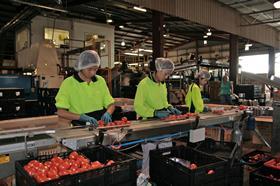
As the Australian parliament looks to wrap up for the year, industry body Voice of Horticulture (VOH) is urging the government to resolve the backpacker tax debate immediately.
With parliament in its final sitting fortnight and no scheduled debate on the backpacker tax for this week, industry bodies and growers are keen to see the now 18-month long debate around the backpacker tax reach a resolution.
Changes to the tax rate of working holiday-visa holders, the majority of which are backpackers, were announced in May last year when the Coalition proposed raising the tax to 32.5 per cent.
Since then, the horticulture industry has remained in the dark as to whether the proposed 32.5 per cent tax rate will remain; whether the compromise of a 19 per cent tax will come into effect; or whether the 10.5 per cent tax proposed by Labor, senator Jacqui Lambie and One Nation senators will see the light of day.
If no decision is made before the end of parliament, a tax rate of 32.5 per cent could kick in from January 2017.
“The issue is beyond being serious, we are losing backpacker numbers by the day as they turn to other countries for a more viable working holiday,” said VOH chair, Tania Chapman. “All across Australia fruit will be left to rot on trees or vines and vegetables abandoned in paddocks because industry cannot find a workforce to pick their produce.
“At the end of the day the whole issue is about real jobs, and Australian farmers who just need to be able to get on with the job knowing they have access to a workforce they desperately need.”
VOH has advocated for a 15 per cent tax rate, in line with the tax rate of seasonal workers.
“Australia must have an internationally competitive tax rate that is attractive to backpackers coming from other destinations, such as Canada and New Zealand, to work and holiday,” Chapman said. “Growers are getting tired of politics threatening the horticulture industry, an industry that has become the fastest growing one in Australia.
“We also must remember that backpackers contribute more than A$3.5bn to the economy each year and around 40,000 find employment on Australian farms. We need more of them, not less to harvest our crops – and that won’t happen with a tax of 32.5 per cent.”
Timeline of the backpacker tax
In May 2015,The Australian government announced the tax in the 2015/16 budget, to come into effect on 1 July 2016, without any prior warning to industry groups or economic modeling on the impact of the proposed tax. The new tax rate would see working holiday markers considered non-residents for tax purposes, meaning a tax rate of 32.5 per cent from the first dollar earned. Previously, transient working holiday markers were considered residents for tax purposes, with no taxable income on the first A$18,200 earned.
In February 2016, industry groups backed a petition launched by the National Farmers’ Federation (NFF) to stop the Australian government’s proposed scrapping of the tax-free threshold for people with working holiday visas.
In August 2016, a review of the tax was announced, with the Australian government welcoming public submissions on the tax until 2 September 2016.
In September 2016, following the review, the government announced it would lower the proposed tax from 32.5 per cent to 19 per cent.
In November 2016, the Labor Party, independent senator Jacqui Lambie and One Nation senators called for the backpacker tax to be amended to 10.5 per cent, in line with New Zealand’s tax rate.
From January 2017, unless new legislation is passed, backpackers could be taxed at 32.5 per cent, though it is still unclear if this will be enforced.






No comments yet